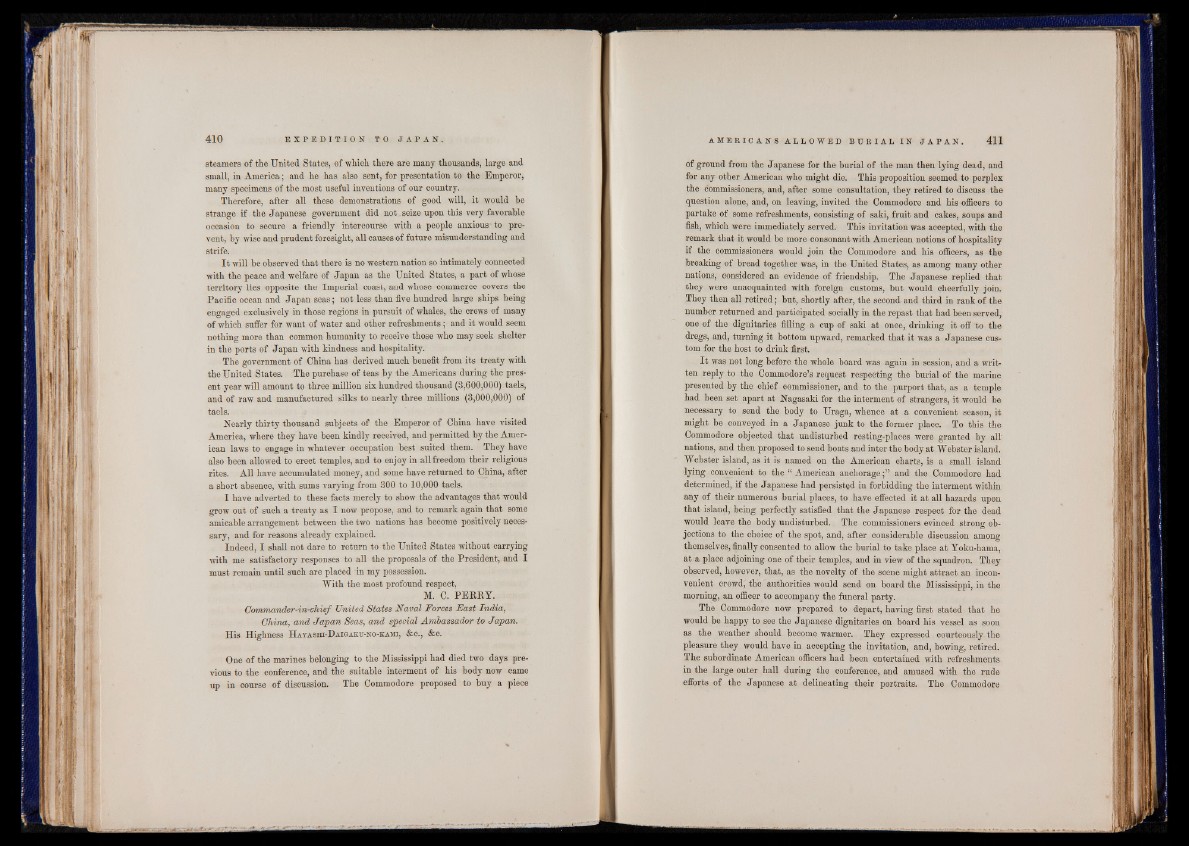
steamers of the United States, of whioh there are many thousands, large and
small, in America; and he has also sent, for presentation to the Emperor,
many specimens of the most useful inventions of our country.
Therefore, after all these demonstrations of good will, it would be
strange if the Japanese government did not seize upon this very favorable
occasion to secure a friendly intercourse with a people anxious to prevent,
by wise and prudent foresight, all causes of future misunderstanding and
strife.
I t will be observed that there is no western nation so intimately connected
with the peace and welfare of Japan as the United States, a part of whose
territory lies opposite the Imperial coast, and whose commerce covers the
Pacific ocean and Japan seas; not less than five hundred large ships being
engaged exclusively in those regions in pursuit of whales, the crews of many
of which suffer for want of water and other refreshments; and it would seem
nothing more than common humanity to receive those who may seek shelter
in the ports of Japan with kindness and hospitality.
The government of China has derived much benefit from its treaty with
the United States. The purchase of teas by the Americans during the present
year will amount to three million six hundred thousand (3,600,000) taels,
and of raw and manufactured silks to nearly three millions (3,000,000) of
taels.N
early thirty thousand subjects of' the Emperor of China have visited
America, where they have been kindly received, and permitted by the American
laws to engage in whatever occupation best suited them. They have
also been allowed to erect temples, and to enjoy in all freedom their religious
rites. All have accumulated money, and some have returned to China, after
a short absenee, with sums varying from 300 to 10,000 taels.
I have adverted to these facts merely to show the advantages that would
grow out of such a treaty as I now propose, and to remark again that some
amicable arrangement between the two nations has become positively necessary,
and for reasons already explained.
Indeed, I shall not dare to return to the United States without carrying
with me satisfactory responses to all the proposals of the President, and I
must remain until such are placed in my possession.
With the most profound respect,
M. C. PERRY.
Gammander-in-chief United States Naval Forces East India,
China, and Japan Seas, and special Ambassador to Japan.
His Highness H a y a s h i -D a ig a k u -n o -k a m i , & c., & c.
One of the marines belonging to the Mississippi had died two days previous
to the conference, and the suitable interment of his body now came
up in course of discussion. The Commodore proposed to buy a piece
of ground from the Japanese for the burial of the man then lying dead, and
for any other American who might die. This proposition seemed to perplex
the commissioners, and, after some consultation, they retired to discuss the
question alone, and, on leaving, invited the Commodore and his officers to
partake of some refreshments, consisting of saki, fruit and cakes, soups and
fish, which were immediately served. This invitation was accepted, with the
remark that it would be more consonant with American notions of hospitality
if the commissioners would join the Commodore and his officers, as the
breaking of bread together was, in the United States, as among many other
nations, considered an evidence of friendship. The Japanese replied that
they were unacquainted with foreign customs, but would cheerfully join.
They then all retired; but, shortly after, the second and third in rank of the
number returned and participated socially in the repast that had been served,
one of the dignitaries filling a cup of saki at once, drinking it off to the
dregs, and, turning it bottom upward, remarked that it was a Japanese custom
for the host to drink first.
I t was not long before the whole board was again in session, and a written
reply to the Commodore’s request respecting the burial of the marine
presented by the chief commissioner, and to the purport that, as a temple
had been set apart at Nagasaki for the interment of strangers, it would be
necessary to send the body to Uraga, whence at a convenient season, it
might be conveyed in a Japanese junk to the former place. To this the
Commodore objected that undisturbed resting-places were granted by all
nations, and then proposed to send boats and inter the body at Webster island.
Webster island, as it is named on the American charts, is a small island
lying convenient to the “ American an ch o rag e an d the Commodore had
determined, if the Japanese had persisted in forbidding the interment within
any of their numerous burial places, to have effected it at all hazards upon
that island, being perfectly satisfied that the Japanese respect for the dead
would leave the body undisturbed. The commissioners evinced strong objections
to the choice of the spot, and, after considerable discussion among
themselves, finally consented to allow the burial to take place at Yoku-hama,
at a place adjoining one of their temples, and in view of the squadron. They
observed, however, that, as the novelty of the scene might attract an inconvenient
crowd, the authorities would send on board the Mississippi, in the
morning, an officer to accompany the funeral party.
The Commodore now prepared to depart, having first stated that he
would be happy to see the Japanese dignitaries on board his vessel as soon
as the weather should become warmer. They expressed courteously the
pleasure they would have in accepting the invitation, and, bowing, retired.
The subordinate American officers had been entertained with refreshments
in the large outer hall during the conference, and amused with the rude
efforts of the Japanese at delineating their portraits. The Commodore